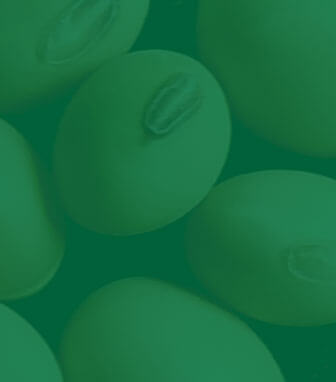Commercial diets used in the aquaculture currently contain marine fishmeal (FM), which has a favorable nutrient profile and palatability, to meet fish nutritional requirements. There is an increasing strain on FM usage in aquafeeds due to the rapid growth of aquaculture and resulting demand for essential amino acids and marine-derived fatty acids. Over the past few decades, a wide variety of plant ingredients have been evaluated as potential alternative protein sources (soybean, lupin seed, rapeseed, cottonseed, carob seed, sunflower seed, pea seed, etc.). Compared to other plant sources, conventional soybean meal (SBM) is one of the most promising alternatives because of its availability, reasonable price, high digestibility, and amino acid profile. Conventional SBM also has anti-nutritional factors (ANFs) that may reduce the nutritive value of fish feeds. Hence, there is an opportunity to improve the nutrient profile and availability of SBM. This research group developed a new technology to reduce the anti-nutritional factors and enhance the protein content of SBM without compromising the nutritional value. This product is referred to as processed soybean meal or EnzoMeal™. EnzoMeal is free from many ANF, such as trypsin inhibitors, lectin and oligosaccharides (100% removed), reduced in phytic acid (78% decreased), and decreased in total carbohydrate content (31%), as well as enhanced in protein content (22%) without altering the amino acid composition.
The aim of this project was to evaluate the nutritional value of EnzoMeal vs SBM in Nile tilapia diets. Three practical diets (isonitrogenous: 38% crude protein, isocaloric (450 kcal/100g) were formulated. The control diet contains 12% FM and the two treatment diets wherein 50% FM was replaced by either SBM or EnzoMeal. Feeding trial was conducted in a re-circulating aquaculture system.
Results from this study reveals that EnzoMeal based fed group exhibited higher growth performance than FM (control) and CSBM fed groups. Feed intake and feed utilization parameters did not differ significantly among the groups. Overall, this study suggests that there is potential for more than 50% replacement of fishmeal with an alternative, sustainable, plant protein such as processed soybean meal (EnzoMeal) for Nile tilapia feed.
Jose Ortiz, Seunghan Lee, Brian Small, Ramanathan Lalgudi, Barry McGraw, and Vikas Kumar. 2019. Comparative nutritional evaluation of processed soybean meal (Enzomeal) vs commercial soybean meal in Nile tilapia. Aquaculture-2019, March 7-9, 2019. page 797.
In another growth study the effect of replacing the dietary fish meal (FM) by soybean meal (SBM) and corn gluten meal (CGM) on growth performance, body composition and serum metabolites of Nile tilapia was studied. Fish were fed 6 isonitrogenous (32% CP), isocaloric (3000 Kcal DE/ Kg) experimental diets in which FM were replace gradually (0, 20, 40, 60, 80 and 100%) by SBM and CGM. The growth performance indices (mean body weight, body weight gain and feed conversion ratio) were measured. At end of the growth trial blood samples were obtained for determination of serum metabolites. Then, whole fish body was used for further proximate and amino acids analysis.
The results revealed that the replacement of FM in diets of juvenile Nile tilapia by SBM and CGM up to 80% did not negatively affect the final mean weight, body weight gain and FCR. However, complete replacement of FM significantly decreased the final mean weight, weight gain and feed consumption, while increased the FCR. The researchers concluded that that the FM in juvenile Nile tilapia diets could be replaced by SBM and CGM up to 80% without significant effects on growth performance, body composition and serum metabolites.
Shimaa. M.R. Salem, A.M. Orma, and T.I. Mohamed. 2019. Replacement of fish by soybean and corn gluten meals in practical diets of Nile tilapia (Oreochromis niloticus). Aquaculture-2019, March 7-9, 2019. page 950.

